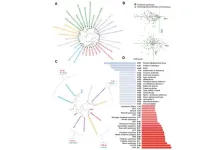(Press-News.org) An enthusiastic response to food in early childhood may be linked to a higher likelihood of experiencing eating disorder symptoms in adolescence, according to a new study led by researchers at UCL and Erasmus University Rotterdam.
The study, published in The Lancet Child & Adolescent Health, looked at survey data from 3,670 young people in the UK and the Netherlands to investigate how appetite traits in early childhood might relate to the likelihood of developing eating disorder symptoms up to 10 years later.
The researchers found that a particularly high food responsiveness, defined as the urge to eat when you see, smell or taste palatable food, at the ages of four and five was linked to a higher likelihood of reporting a range of eating disorder symptoms at ages 12 to 14.
The team also found that a slower pace of eating and feeling full more quickly (high sensitivity to satiety) in early childhood may be protective against developing some eating disorder symptoms later.
Co-lead author Dr Ivonne Derks (UCL Institute of Epidemiology & Health Care) said: “Although our study cannot prove causality, our findings suggest food cue responsiveness may be one predisposing risk factor for the onset of eating disorder symptoms in adolescence.
“However, high responsiveness to food is also a normal and very common behaviour and should be seen as just one potential risk factor among many rather than something to cause parents worry.”
Higher food responsiveness was linked to a 16% to 47% increase in the odds of reporting eating disorder symptoms, including binge eating symptoms, uncontrolled eating, emotional eating, restrained eating and compensatory behaviours.
The 47% increase was found for binge eating symptoms (eating a very large amount of food and/or experiencing the feeling of loss of control over eating), meaning that adolescents whose parents rated them highest on food responsiveness were almost three times more likely to report binge eating symptoms compared to adolescents whose parents scored them lowest.
A 16% increase in odds was found for restrained eating, whereby a person restricts their intake of food to lose weight or avoid weight gain.
Just like food responsiveness, emotional overeating in early childhood was also linked with higher odds of engaging in compensatory behaviours, which are intended to avoid weight gain, such as skipping meals, fasting and excessive exercise.
In turn, some appetite traits seemed to be protective against developing eating disorder symptoms later. Higher satiety responsiveness – that is, feeling full more quickly after eating, and feeling full for longer – was linked to lower odds of uncontrolled eating (defined as the extent to which someone feels out of control and eats more than usual) and compensatory behaviours.
A slower pace of eating, meanwhile, was linked to lower odds of compensatory behaviours and restrained eating.
The researchers also found that appetite traits such as food fussiness, emotional undereating (eating less due to low mood), and enjoyment of food in early childhood were not linked to later eating disorder symptoms in adolescence.
For the study, the researchers looked at data from two separate longitudinal studies: Generation R, following children born in Rotterdam, the Netherlands, between 2002 and 2006, and Gemini, which follows twins born in England and Wales in 2007.
Appetite traits were assessed based on parents’ questionnaire responses when the children were aged four or five. Eating disorder symptoms were self-reported by the then adolescents themselves at ages 12 to 14, when eating disorder symptoms typically start to emerge.
About 10% of the adolescents reported binge eating symptoms, where people eat an unusual amount of food and/or experience the feeling of loss of control over eating. Next to that, 50% reported at least one behaviour to compensate their food intake or to avoid gaining weight, such as skipping a meal.
Co-senior author Dr Clare Llewellyn (UCL Institute of Epidemiology & Health Care) said: “While the role of appetite in the development of obesity has been studied for many decades, this is the first study to comprehensively examine the role of appetite traits in the development of eating disorder symptoms.
“Eating disorders can be harder to treat effectively once they develop and so it would be better to prevent them from occurring in the first place. Our work in identifying risk factors in early life aims to support the development of possible prevention strategies. These could, for instance, involve providing extra support to children at higher risk.”
Appetite traits indicate how we respond to food and the opportunity to eat, and the extent to which we want to eat more or less when experiencing negative emotions. They are divided into food approach appetitive traits (e.g. food responsiveness, enjoyment of food, emotional overeating) and food avoidance traits (e.g. satiety responsiveness, food fussiness, slowness in eating, emotional undereating).
Co-senior author Professor Pauline Jansen of Erasmus University Rotterdam said: “Overall, our findings suggest that developing and testing prevention strategies may be a worthwhile effort. Although appetite has a substantial genetic component, we also know that there are environmental influences that offer opportunities for behaviour change.”
The researchers indicate that a healthy food environment and responsive parental feeding strategies may help to lower the risk of developing eating disorders.
Co-lead author Dr Zeynep Nas (UCL Institute of Epidemiology & Health Care) explained: “A healthy food environment is an environment in which healthy foods are available and more prominent, salient and affordable than less healthy options. This also includes wider access to food such as what types of food outlets are available in our neighbourhood and what food we see on TV.
“Responsive feeding is about providing nutritious food at set mealtimes and snack times, and then allowing the child to decide what to eat and how much to eat (if anything at all) without pressuring them.”
In a separate paper, accepted for publication in the International Journal of Eating Disorders, a similar research team looked at the same two cohorts, Generation R and Gemini, to investigate how parental feeding practices in early childhood might affect likelihood of eating disorder symptoms in adolescence.
The researchers found that non-responsive feeding practices, such as putting pressure on children to eat or using food as a reward or to soothe emotions, were linked to a higher likelihood of specific eating disorder symptoms later. However, the associations were small and varied between the two cohorts, and the researchers said further replication studies were needed.
The research was supported by the mental health charity MQ Mental Health Research, Rosetrees Trust, and the Netherlands Organisation for Health Research and Development (ZonMw).
END
Avid appetite in childhood linked to later eating disorder symptoms
An enthusiastic response to food in early childhood may be linked to a higher likelihood of experiencing eating disorder symptoms in adolescence, finds a new study led by researchers at UCL (University College London) and Erasmus University Rotterdam.
2024-02-21
ELSE PRESS RELEASES FROM THIS DATE:
Red light can reduce blood glucose levels, says study
2024-02-21
The researchers found that 670 nanometres (nm) of red light stimulated energy production within mitochondria, the tiny powerhouses within cells, leading to increased consumption of glucose. In particular, it led to a 27.7% reduction in blood glucose levels following glucose intake, and it reduced maximum glucose spiking by 7.5%.
While the study was conducted in healthy individuals, the non-invasive, non-pharmacological technique has the potential to have an impact on diabetes control after meals, as it can reduce damaging fluctuations of blood glucose in the body that contribute to ageing.
The study also highlights the significant long-term consequences for human health, including ...
UT-Battelle donates $186,000 to support SEEED’s green construction program
2024-02-21
Oak Ridge National Laboratory’s managing contractor, UT-Battelle, presented a donation of $186,000 to Socially Equal Energy Efficient Development, or SEEED, to support the nonprofit’s third green solar home as part of their Green Construction Program.
“We are committed to serving the communities that we live in,” UT-Battelle CEO and ORNL Director Stephen Streiffer said. “Our partnership with SEEED has provided a tremendous opportunity to share our scientific expertise, and we are excited that our support will help make this green solar home become a reality.”
Streiffer joined SEEED for a groundbreaking ceremony in Knoxville, Tenn., at the home project ...
Spinning, magnetic micro-robots help researchers probe immune cell recognition
2024-02-21
Researchers at the Pritzker School of Molecular Engineering and the Department of Chemistry at the University of Chicago have engineered tiny, spinning micro-robots that bind to immune cells to probe their function. The robot, or “hexapod,” gives scientists a new, highly adaptable way to study immune cells and to aid in the design of immunotherapies against cancer, infection, or autoimmune diseases.
Each hexapod robot has six arms containing molecules that might be recognized as foreign by the immune system — such as protein fragments from a tumor, virus, or ...
Helping patients with low income overcome eating disorders
2024-02-21
Individuals with eating disorders who have low income are frequently misdiagnosed and lack adequate access to appropriate therapy, according to researchers from Weill Cornell Medicine and Columbia University Vagelos College of Physicians and Surgeons.
Their paper, published in The Cognitive Behaviour Therapist on Feb. 19, identified the barriers to care that come with having low income and offered guidelines on how therapists can make accommodations for these patients to improve diagnoses and access to treatment.
Approximately 30 million people in the United States experience ...
Preventing relapse by restoring an opioid-weakened brain pathway governing behavior
2024-02-21
Medical University of South Carolina scientists report in Neuron that they have uncovered a way to restore an opioid-weakened brain pathway in a preclinical model.
With funding from the National Institute on Drug Abuse, part of the National Institutes of Health, the MUSC research team, led by neuroscientist James Otis, Ph.D., used advanced neuroscience tools to return a pathway between the thalamus and basal ganglia to healthy functioning in mice. As a result, this restoration prevented mice that were opioid-dependent from seeking or self-administering heroin. Results also suggested that sustained opioid use was the cause of this weakened pathway, rather than being caused by ...
Water quality monitor, locust-inspired electronic nose under development
2024-02-21
By Beth Miller
Two teams of engineers led by faculty in the McKelvey School of Engineering at Washington University in St. Louis will work toward developing products to monitor drinking water quality and to detect explosives with an electronic nose with one-year, $650,000 Convergence Accelerator Phase 1 grants from the National Science Foundation (NSF).
Barani Raman, professor of biomedical engineering, and Daniel Giammar, the Walter E. Browne Professor of Environmental Engineering, will lead teams of researchers from Washington University and other institutions and entities funded under the NSF’s Convergence Accelerator program, designed to address national-scale ...
Child tax credits provided significant relief to families experiencing economic shocks during COVID
2024-02-21
Contact:
Jillian McKoy, jpmckoy@bu.edu
Michael Saunders, msaunder@bu.edu
##
As a proposal to reinstate expanded Child Tax Credits (CTC) in the United States awaits a vote in the Senate, a new study led by Boston University School of Public Health (BUSPH) researchers reveals that the now-expired 2021 CTC expansion benefitted families experiencing financial setbacks due to health or employment challenges spurred by the COVID-19 pandemic.
Published in the journal Health Affairs Scholar, the study found that monthly advance payments included in the 2021 CTC ...
Plasma scientists develop computer programs that could reduce the cost of microchips and stimulate American manufacturing
2024-02-21
Fashioned from the same element found in sand and covered by intricate patterns, microchips power smartphones, augment appliances and aid the operation of cars and airplanes. Now, scientists at the U.S. Department of Energy’s (DOE) Princeton Plasma Physics Laboratory (PPPL) are developing computer simulation codes that will outperform current simulation techniques and aid the production of microchips using plasma, the electrically charged state of matter also used in fusion research. These codes could help increase the efficiency of the manufacturing process and potentially stimulate ...
Novel combination therapy offers promising results for treatment-refractory hepatoblastoma
2024-02-21
Hepatoblastoma (HB) is the most common liver cancer in children. Researchers and physicians in the field are concerned because in the last decade HB has been rising rapidly worldwide and has seen the most rapid increase among all pediatric solid tumors.
A team led by researchers at Baylor College of Medicine has been working on improving therapies for this devastating disease. They recently reported in the Journal of Hepatology a novel treatment strategy that produced encouraging results in animal models.
“High-risk disease leads to high rates of relapse and mortality,” said first author Dr. Andrés F. Espinoza, general ...
New study: Defining the progeria phenome
2024-02-21
“In sum, we have defined what a premature aging disease is and developed tools to allow diagnostics of patients and disease population.”
BUFFALO, NY- February 20, 2024 – A new research paper was published in Aging (listed by MEDLINE/PubMed as "Aging (Albany NY)" and "Aging-US" by Web of Science) Volume 16, Issue 3, entitled, “Defining the progeria phenome.”
Progeroid disorders are a heterogenous group of rare and complex hereditary syndromes presenting with pleiotropic phenotypes associated with normal aging. Due to the ...
LAST 30 PRESS RELEASES:
Sleep loss linked to higher atrial fibrillation risk in working-age adults
Visible light-driven deracemization of α-aryl ketones synergistically catalyzed by thiophenols and chiral phosphoric acid
Most AI bots lack basic safety disclosures, study finds
How competitive gaming on discord fosters social connections
CU Anschutz School of Medicine receives best ranking in NIH funding in 20 years
Mayo Clinic opens patient information office in Cayman Islands
Phonon lasers unlock ultrabroadband acoustic frequency combs
Babies with an increased likelihood of autism may struggle to settle into deep, restorative sleep, according to a new study from the University of East Anglia.
National Reactor Innovation Center opens Molten Salt Thermophysical Examination Capability at INL
International Progressive MS Alliance awards €6.9 million to three studies researching therapies to address common symptoms of progressive MS
Can your soil’s color predict its health?
Biochar nanomaterials could transform medicine, energy, and climate solutions
Turning waste into power: scientists convert discarded phone batteries and industrial lignin into high-performance sodium battery materials
PhD student maps mysterious upper atmosphere of Uranus for the first time
Idaho National Laboratory to accelerate nuclear energy deployment with NVIDIA AI through the Genesis Mission
Blood test could help guide treatment decisions in germ cell tumors
New ‘scimitar-crested’ Spinosaurus species discovered in the central Sahara
“Cyborg” pancreatic organoids can monitor the maturation of islet cells
Technique to extract concepts from AI models can help steer and monitor model outputs
Study clarifies the cancer genome in domestic cats
Crested Spinosaurus fossil was aquatic, but lived 1,000 kilometers from the Tethys Sea
MULTI-evolve: Rapid evolution of complex multi-mutant proteins
A new method to steer AI output uncovers vulnerabilities and potential improvements
Why some objects in space look like snowmen
Flickering glacial climate may have shaped early human evolution
First AHA/ACC acute pulmonary embolism guideline: prompt diagnosis and treatment are key
Could “cyborg” transplants replace pancreatic tissue damaged by diabetes?
Hearing a molecule’s solo performance
Justice after trauma? Race, red tape keep sexual assault victims from compensation
Columbia researchers awarded ARPA-H funding to speed diagnosis of lymphatic disorders
[Press-News.org] Avid appetite in childhood linked to later eating disorder symptomsAn enthusiastic response to food in early childhood may be linked to a higher likelihood of experiencing eating disorder symptoms in adolescence, finds a new study led by researchers at UCL (University College London) and Erasmus University Rotterdam.


